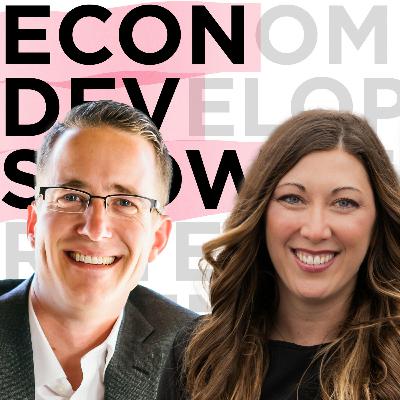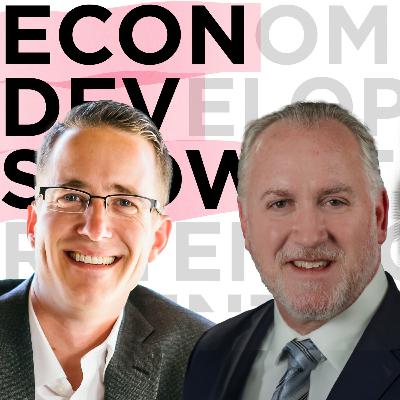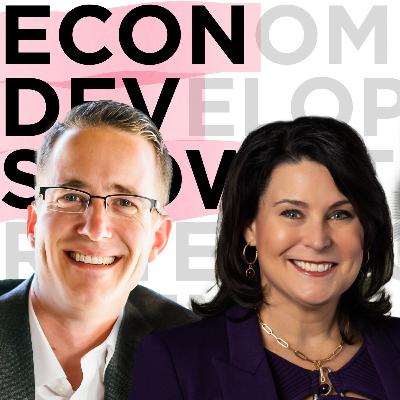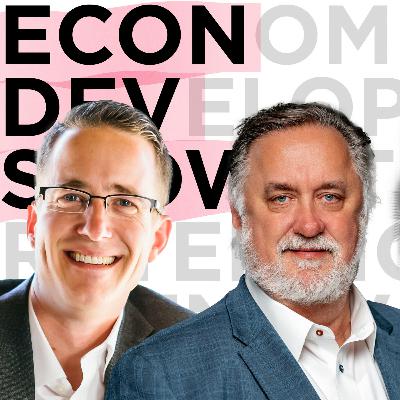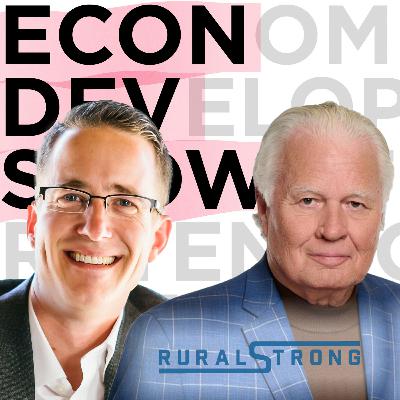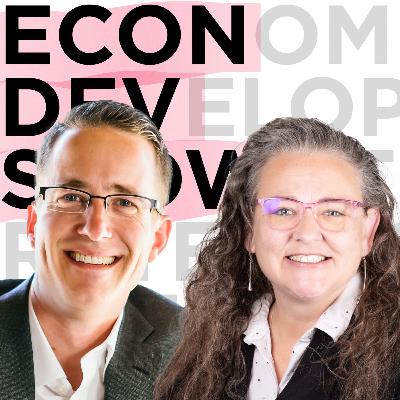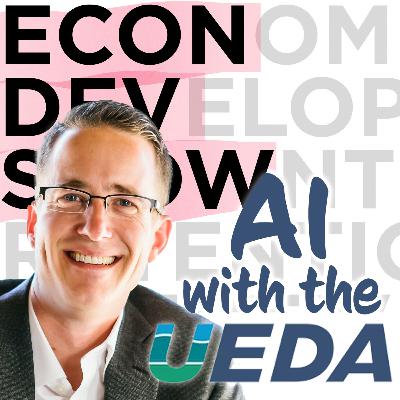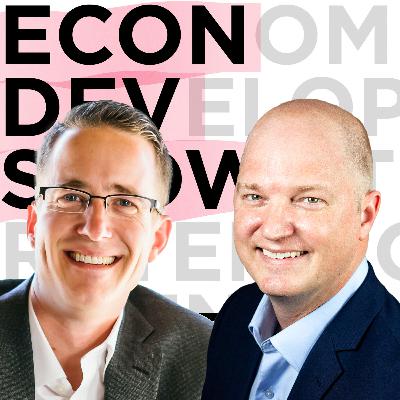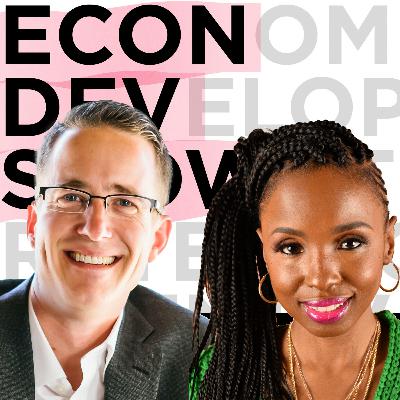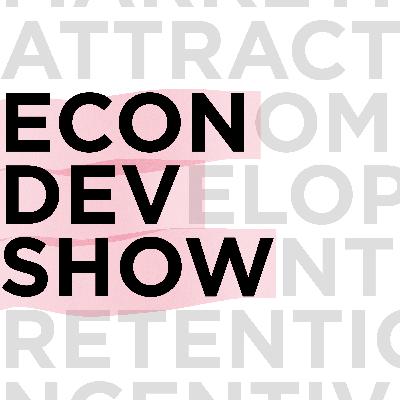Discover Econ Dev Show Podcast - Economic Development
Econ Dev Show Podcast - Economic Development

Econ Dev Show Podcast - Economic Development
Author: Dane Carlson
Subscribed: 16Played: 718Subscribe
Share
© 2026 Dane Carlson
Description
Dane Carlson explores the strategies, ideas, and insights that are driving economic development forward into the future. You'll hear new insights from passionate ED's about their successes and struggles, and you'll learn from attraction and retention experts about how to apply actionable strategies inside your EDO. We'll help take your organization, your community, and your career to the next level.
211 Episodes
Reverse
In this episode of the Econ Dev Show, Dane Carlson talks with Eric Voyles, Executive Vice President and Chief Economic Development Officer for TexAmericas Center, about how a former 8,900-acre military installation became one of the most innovative redevelopment authorities in the country. Eric explains how eliminating public review delays, investing millions in environmental cleanup, controlling rail and logistics assets, and focusing relentlessly on speed to occupancy have allowed TexAmericas Center to compete for heavy and light manufacturing projects.
From creative risk-taking with early-stage companies to clearing 250-acre rail-served sites after losing a deal, this conversation is a masterclass in how data, preparation, and governance alignment drive real economic development results.
Like this show? Please leave us a review here — even one sentence helps!
10 Actionable Takeaways for Economic Developers
Make time your primary incentive. If possible, remove unnecessary entitlement layers and compress approval timelines. Speed reduces perceived risk.
Self-certify before paying for certification. Develop internal "qualified site" standards so prospects can complete due diligence faster.
Track inventory in categories. Move-in ready, construction ready, shovel ready, rail served, etc. Clarity accelerates decisions.
Invest after losing. If you lose a project for a specific reason, eliminate that weakness permanently, even if it costs real money.
Treat small buildings as assets. Flexible, modular inventory can win projects creatively, even when you lack a single large structure.
Control key assets when possible. Owning rail, logistics, or utilities strengthens your value proposition and revenue model.
Be willing to take calculated risk on local companies. Early bets on scalable firms can create long-term anchor employers.
Align your board around business realities. Populate governance with people who understand customers, not just politics.
Operate like a private developer. Use CRM systems, outsourcing where efficient, and disciplined deal flow management.
Let data guide strategy. Understand supply and demand curves in your region before pushing incentives or marketing narratives.
Special Guest: Eric Voyles.
In this episode of the Econ Dev Show, Dane Carlson sits down with Heath Vescovi-Chiordi, Director of Economic Development for Pima County, Arizona, to explore how one of the largest counties in the country balances rural biodiversity, cross-border trade with Mexico, aerospace and optics clusters, semiconductor workforce development, and even controversial data center projects.
Heath shares how a four-and-a-half-person team coordinates across municipalities, tribal nations, academia, and public health to execute a regional strategy that blends quantitative results with qualitative community engagement.
From a $1.2 billion battery manufacturing project to evolving policies on nondisclosure agreements and enhanced due diligence, this conversation offers a behind-the-scenes look at modern county-level economic development in action
Like this show? Please leave us a review here — even one sentence helps! Special Guest: Heath Vescovi-Chiordi.
In this episode of the Econ Dev Show, Dane Carlson sits down with Lisa Hurley, Executive Director of the York County Development Corporation in Nebraska, to talk about what modern rural economic development actually looks like on the ground.
Lisa shares how York County leverages its logistics position, diversified employers, and growing civic pride while navigating workforce shortages, childcare capacity, housing pressure, and community resistance to change. They discuss talent attraction campaigns, podcasting as an economic development tool, and why rural EDOs must now think far beyond traditional business recruitment.
The conversation also explores leadership, burnout, mentoring the next generation of economic developers, and how Lisa is using AI to save time while staying human where it matters most.
Like this show? Please leave us a review here — even one sentence helps!
Ten Actionable Takeaways for Economic Developers
Treat childcare capacity as core economic infrastructure, not a side issue
Invest in talent marketing even when results are hard to attribute directly
Use layered messaging across state, local, and employer campaigns
Build trust by proactively sharing progress and visuals with the community
Accept that some resistance to change cannot be resolved, only managed
Partner aggressively to avoid owning every initiative yourself
Use podcasts and storytelling to humanize your community and organization
Leverage AI for HR, editing, and admin work to protect business-facing time
Mentor younger economic developers to reduce burnout and build continuity
Remember that stopping a bad project can be a win, not a failure
Special Guest: Lisa Hurley.
In this episode of the Econ Dev Show, Dane Carlson sits down with Ellie Reynolds, President and CEO of the Douglas County Economic Development Corporation, to unpack how one of Colorado’s fastest-growing counties balances quality of life, infrastructure investment, regulatory realities, and speed-to-market.
Ellie shares how Douglas County positions itself along the Front Range, why shovel-ready infrastructure matters more than incentives alone, how cutting red tape became a competitive strategy, and what economic developers can do locally when state-level constraints get in the way.
The conversation also dives into AI as a staff multiplier, coalition-building for regulatory reform, and why economic development is ultimately about reducing risk, not forcing growth.
Like this show? Please leave us a review here — even one sentence helps! Special Guest: Ellie Reynolds.
In this episode of the Econ Dev Show, Dane Carlson sits down with Juliet Abdel, President and CEO of the Cedar Rapids Metro Economic Alliance, to talk about building a regionally focused, globally minded economic development organization.
Drawing on Cedar Rapids' "fifth season" advantage (time, accessibility, and quality of life) Juliet shares how the region leverages industry clusters, international relationships, and leadership discipline to compete.
The conversation blends practical economic development strategy with candid insights on burnout, boundaries, and leading people well in a demanding field.
Like this show? Please leave us a review here — even one sentence helps!
10 Actionable Takeaways for Economic Developers
Treat quality of life as a competitive asset, not a marketing afterthought.
Focus attraction efforts on industry clusters that naturally complement what already exists locally.
International business development does not require a global city, only consistent relationship-building.
Cast a clear vision so teams understand the "why," not just the tasks.
Protect staff health by modeling boundaries, especially around after-hours communication.
Build attraction strategies around regional strengths, not generic wish lists.
Encourage team members to say no when capacity or clarity is missing.
Leverage peer networks aggressively. Most good ideas already exist somewhere else.
Recognize burnout as an organizational risk, not a personal weakness.
Remember that economic development works best when personal well-being and professional performance reinforce each other.
Special Guest: Juliet Abdel.
In this episode of the Econ Dev Show, host Dane Carlson sits down with Mike Kamerlander, President and CEO of the Hays Caldwell Economic Development Partnership, to discuss what economic development looks like inside one of the fastest-growing regions in Texas.
Drawing from HCEDP’s recent Economic Outlook Event, the conversation explores why Central Texas continues to attract companies, how cities, counties, and private businesses are investing through uncertainty, and what shifting project timelines signal for 2026. Mike also shares lessons from leading a two-county, ten-city partnership, why “no product, no project” still holds true, and how speed, predictability, and engagement quietly determine which regions win.
FYI, "No Product, No Project" is a registered trademark of Garner Economics LLC.
Like this show? Please leave us a review here — even one sentence helps!
10 Actionable Takeaways for Economic Developers
Product readiness matters more than marketing language.
Speed and predictability often outweigh incentive packages.
Regional collaboration expands capacity without diluting local wins.
Growth planning must stay ahead of infrastructure demand.
Economic outlook events are tools for alignment, not just forecasting.
Accurate, current site information prevents deal-killing surprises.
Cities and counties should be treated as the primary customer.
Engagement across private industry strengthens long-term outcomes.
Development processes should be reviewed continuously, not periodically.
Capital on the sidelines eventually moves. Be ready when it does.
Special Guest: Mike Kamerlander.
In this episode of the Econ Dev Show, Dane Carlson sits down with Jessica Huble, Assistant Director of Redevelopment for the City of Sugar Land, Texas, to explore how a landlocked, master-planned suburb is rethinking growth, housing, and economic sustainability. The conversation dives into Sugar Land’s unique history as a company town built around Imperial Sugar, the creation of a dedicated Department of Redevelopment, and why single-family housing alone cannot support a city’s long-term finances.
Jessica explains how community engagement, honest trade-off conversations, flexible planning, and city-led redevelopment of the historic Imperial site are shaping Sugar Land’s next chapter, offering lessons for any community facing limited land, changing markets, and rising expectations.
Like this show? Please leave us a review here — even one sentence helps!
10 actionable takeaways for economic developers
If your city is landlocked, every acre decision is a long-term financial decision
Single-family housing alone will not sustain municipal services over time
Create space for redevelopment before crisis forces it
Be honest with residents about trade-offs, not just benefits
Sales tax strategy matters just as much as property tax in many states
Avoid being overly prescriptive in RFQs and redevelopment plans
Lead with outcomes and identity, not tenant wish lists
Community visioning works best when residents are asked real questions
Historic assets should inform the future, not freeze it
Cities that fail to adapt risk losing relevance, not just revenue
Special Guest: Jessica Huble.
In this episode of the Econ Dev Show, host Dane Carlson talks with Joya Stetson, Community Development Director at the Minnesota Valley Transit Authority (MVTA), about how transit directly shapes workforce access, development costs, and long-term community competitiveness.
Joya unpacks “first mile/last mile” barriers and how tools like microtransit and service tweaks can turn missed connections into real outcomes, including route changes that unlocked student internships and boosted ridership.
They dig into suburban realities like coverage vs. ridership, post-COVID recovery, and why transit belongs inside RFP workforce narratives, land-use planning, and even parking requirement conversations.
Like this show? Please leave us a review here — even one sentence helps!
10 Actionable Takeaways for Economic Developers
Get your transit provider “at the table” early for major projects, not after the announcement, so service planning can match real hiring needs.
Treat “workforce access” as more than unemployment rates: explicitly describe how transit expands the labor pool and reduces absenteeism and turnover risk.
Audit first-mile/last-mile gaps for key job centers, campuses, and training sites; don’t assume a route nearby means people can actually reach it.
Use microtransit strategically to bridge gaps, but pair it with fixed routes when predictable arrival times matter (classes, shifts, internships).
Build a “route change wins” pipeline: channel feedback from chambers, employers, schools, and workforce boards into concrete service-change proposals.
Include transit in your site selection/RFP package (especially the workforce section): routes, frequency, last-mile options, and how employers can engage.
Coordinate transit with land-use planning and TOD goals so comp plans and transit plans evolve together instead of living on shelves.
Use transit to reduce development friction: make the case for lower parking requirements where transit access supports it.
Map housing-to-transit-to-jobs (especially affordable housing) to show actual accessibility and to target investments or service pilots.
Frame transit as competitiveness and sustainability: companies care about low-carbon performance, and mobility options are part of that story.
Special Guest: Joya Stetson.
In this episode of the Econ Dev Show, host Dane Carlson sits down with John Loyack of the North Carolina Community College System to unpack what “workforce development” looks like when you’re the person who gets the call the day after the ribbon cutting asking where the next 500–5,000 workers will come from—and how North Carolina answers that question through four major tools: NC Edge customized training, ApprenticeshipNC, the Bio Network (now stretching from life sciences into food/beverage and natural products), and a small business center network embedded across 58 community colleges, all while pushing for tighter collaboration so employers experience one connected system instead of disconnected silos.
Like this show? Please leave us a review here — even one sentence helps!
10 Actionable Takeaways for Economic Developers
Treat workforce development as core infrastructure, not a support function.
Engage community colleges early, not after a project announcement.
Promote customized training programs aggressively to prospects and existing employers.
Use pre-hire assessments to reduce employer risk on major projects.
Encourage employers, even competitors, to collaborate on shared talent needs.
Leverage apprenticeship programs beyond manufacturing into healthcare, construction, and trades.
Think regionally, not jurisdiction by jurisdiction, when building talent pipelines.
Repurpose successful training models across industries where skills overlap.
Break down silos between workforce, small business, and economic development teams.
Communicate these resources constantly because most businesses do not know they exist.
Special Guest: John Loyack.
In this episode of the Econ Dev Show, Dane Carlson talks with Timothy Comerford of Biggins Lacey & Shapiro about the rapidly shifting reality of power availability in site selection.
Tim explains how explosive demand from data centers and industrial users is overwhelming electric utilities, reshaping incentive policy, and lengthening timelines for securing capacity. He breaks down the biggest misconceptions around power lead times, why transmission is often the bottleneck, how utilities are adapting with costly engineering studies and take-or-pay requirements, and what steps EDOs must take to credibly position their sites.
This is a masterclass on the new electricity-driven geography of economic development.
Like this show? Please leave us a review here — even one sentence helps!
Ten Actionable Takeaways for Economic Developers
Build strong, direct relationships with utility contacts who will actually talk to prospects.
Understand that real timelines for securing large loads run in years, not months.
Work with utilities to pre-identify transmission routes and right-of-way feasibility.
Gather realistic load estimates from prospects instead of just taking their engineer's peak numbers.
Know whether your sites already sit near substations with real remaining capacity.
Incorporate redundancy needs early, since 100 percent backup can double infrastructure requirements.
Prepare for developers who request huge speculative loads and learn how to differentiate serious projects.
Recognize that incentives tied to data centers may face political pressure due to ratepayer impacts.
Push utilities and state partners to invest in long-range planning that anticipates industrial and data center growth.
Educate local stakeholders that modern site readiness now includes power readiness as a top priority.
Special Guest: Timothy Comeford.
In this episode of the Econ Dev Show, Dane Carlson talks with Johnna Reeder Kleymeyer, President and CEO of the Colorado Springs Chamber and EDC, about how Colorado Springs is uniting its region to compete globally, building on its deep aerospace, defense, and cybersecurity assets, and expanding advanced manufacturing powered by a steady military-to-civilian talent pipeline.
She explains the origin of the Colorado Aerospace and Defense Economic Council, the importance of advocacy for small and mid-sized contractors, how site selection really plays out in a mountain market, and why economic development still matters most at the level of individual opportunity.
From cluster strategy to workforce realities to the joy of cutting a ribbon on a transformational project, Johnna offers insight from a 30-year career building thriving communities.
Like this show? Please leave us a review here — even one sentence helps! Special Guest: Johnna Reeder Kleymeyer.
In this episode of the Econ Dev Show, Dane Carlson talks with economic development veteran and consultant Marty Vanags about Circles of Seven, a peer-based mentoring program designed to strengthen post-startup small businesses who often fall through the cracks of traditional support systems.
Marty explains how C7 groups work, why small businesses learn best from each other, and how these circles create long-lasting bonds that improve BRE, build confidence, and ultimately make communities more attractive to prospects. He also touches on Next Wave Leadership, the importance of in-person connection, and why economic developers should spend more time nurturing the businesses they already have.
Like this show? Please leave us a review here — even one sentence helps!
10 Actionable Takeaways for Economic Developers
Target the "liminal stage" -- businesses past the startup phase but not yet established need the most support and often have the fewest resources.
Build peer-to-peer programs, not just classes -- small businesses learn better from each other than from lectures.
Recruit strong facilitators, not "experts" -- a good mentor is a steady guide, not a guru.
Create predictable monthly prompts (articles, videos, questions) to spark meaningful discussion.
Require at least 30 minutes on the main topic so participants get what they came for.
Train facilitators in group dynamics, not business theory -- their job is to manage conversation, not teach.
Use C7-style programs as BRE tools -- they put you in front of businesses you rarely interact with.
Remember cash flow and time are always the biggest pain points for small businesses.
Encourage in-person interaction -- especially post-COVID, live meetings build deeper relationships and accountability.
Measure success by longevity -- if your groups keep meeting years later, your ecosystem is working.
Special Guest: Martin Vanags.
On this special crossover episode, Dane Carlson joins Joe Barker on the Rural Strong Podcast to talk about Sitehunt, entrepreneurship, and the power of AI to help rural and small-community economic developers compete at scale.
In this episode of Rural Strong, Joe and Dane explore how AI tools like Sitehunt automate site analysis, RFI responses, and data collection — giving small EDOs the same analytical firepower as their big-city counterparts. Dane shares his unlikely journey from early-2000s internet entrepreneur to chamber president in the Sierra Nevada foothills to Texas economic-development director to startup CEO. They discuss why feedback matters more than features, why execution beats ideas every time, and why even the smallest communities need a modern website, a plan, and the willingness to pivot.
Dane also unpacks how child care, housing, and workforce shortages have become the new pillars of competitiveness, why AI is best thought of as a “dim-witted but persistent intern,” and how rural leaders can use technology to take back the information advantage from site selectors.
Like this show? Please leave us a review here — even one sentence helps!
Ten Actionable Takeaways for Economic Developers
Treat AI as an intern, not an oracle. Feed it data and context to get useful answers.
Launch before you're ready. Iterate in public and let real feedback drive improvement.
Build a website that sells your community. Clear contact info and photos matter more than fancy graphics.
Use LinkedIn as your industry newspaper. Learn from and connect with other EDOs daily.
Start a local podcast. It's the best modern BRE tool and a non-threatening way to engage businesses.
Plan but pivot. No plan survives first contact with reality; stay nimble.
Address child care and housing head-on. They're workforce issues now, not social ones.
Prioritize execution over ideas. A mediocre idea well executed beats a brilliant idea untried.
Save cash for the long haul. Entrepreneurs fail more often from running out of runway than from bad concepts.
Ask for feedback early and often. It's how both products and communities get better.
In this episode of the Econ Dev Show, Candi Clouse from IMPLAN joins Dane Carlson to unpack how the fifty-year-old economic-impact platform grew from a U.S. Forest Service project into the industry’s gold standard for analyzing how local and regional economies respond to change. She explains the basics of input-output modeling, how opening a single manufacturing plant can affect hundreds of related industries and household spending, and describes how IMPLAN empowers users to measure those effects in real time.
Candi also shares her personal journey from psychology to economic development, the surprising ripple effects of Ohio’s motion-picture tax credit, and how IMPLAN’s data helps states compare investments, balance urban-rural needs, and plan for reshoring and supply-chain shifts.
Like this show? Please leave us a review here — even one sentence helps! Special Guest: Candi Clouse.
In this episode of the Econ Dev Show, host Dane Carlson shares his talk from the Utility Economic Development Association’s 2025 Fall Forum in Traverse City, Michigan. He explains how artificial intelligence is transforming economic development from a guessing game into a data-driven discipline. Drawing from his work with Sitehunt, Dane reveals how utilities can turn raw infrastructure data like power, water, sewer, and fiber into actionable intelligence that accelerates projects, shortens RFI responses, and drives smarter investment decisions. He challenges listeners to stop optimizing for Google and start optimizing for AI, showing how even small steps like making one dataset machine readable can reshape how regions grow and compete.
Like this show? Please leave us a review here — even one sentence helps!
10 Actionable Takeaways for Economic Developers
Make one dataset machine readable, even if it is internal. It is the first step toward AI readiness.
Think of AI as infrastructure, not a chatbot. Build systems that work continuously, not conversations.
Use APIs to connect your data, automate workflows, and ensure consistency.
Chain models together to combine reasoning, data retrieval, and structured writing capabilities.
Capture tribal knowledge by converting what only a few people know into structured, shareable data.
Automate RFI responses by integrating structured site data with AI models for instant scoring.
Start vibe coding by describing outcomes and intent instead of writing brittle, rigid logic.
Stop optimizing for Google. Design your data for AI systems that synthesize and act.
Run small experiments monthly to test new models and internal automations.
Advocate inside your organization. Utilities are the backbone of AI enabled economic development.
In this episode of the Econ Dev Show, Dane Carlson talks with Joe Rudemiller, Vice President of Marketing and Communications at Cincinnati Center City Development Corporation (3CDC), about how the organization helped turn Over-the-Rhine from a crime-ridden, disinvested neighborhood into one of America’s most celebrated urban communities.
Joe shares how strategic partnerships with the corporate sector, catalytic public spaces, historic preservation, and mission-driven development created a vibrant, mixed-income district filled with local businesses and active civic life.
He also discusses how programming, special improvement districts, and community initiatives like GeneroCity 513 and fair-chance hiring continue to strengthen the fabric of downtown Cincinnati — and what lessons other cities can apply to their own revitalization efforts.
Like this show? Please leave us a review here — even one sentence helps!
10 Actionable Takeaways for Economic Developers
Partner with the corporate community -- Long-term commitment from anchor companies can provide patient capital and momentum for revitalization.
Start small and scale -- Begin with one corner or block to build early wins and demonstrate what's possible.
Use historic assets as a foundation -- Preserving and reusing historic buildings can anchor revitalization and attract residents and businesses.
Prioritize mixed-income housing -- Transitioning from condos to affordable and workforce housing ensures inclusive growth.
Activate civic spaces -- Programming parks and plazas year-round builds community and safety.
Think beyond real estate -- Manage business improvement districts, events, and outreach to sustain neighborhood vibrancy.
Leverage federal incentives -- Tools like New Markets and Historic Tax Credits can make otherwise infeasible projects work.
Align with city leadership without being bound by it -- A nimble, non-governmental structure can speed decision-making while maintaining alignment.
Invest in social programs -- Initiatives like homeless outreach and fair-chance hiring strengthen community ties and outcomes.
Catalyze private investment -- Public or nonprofit investment can pave the way for private development once confidence builds.
Special Guest: Joe Rudemiller.
In this episode of the Econ Dev Show, Dane Carlson talks with Kat Guillaume-Delemar, President and CEO of the Center for Community Progress, the nation’s only nonprofit dedicated to fixing the systems that lead to widespread vacant, abandoned, and deteriorated properties. Kat shares how systemic vacancy harms communities — from lowering property values and public health to blocking economic opportunity — and explains how policy reform, land banking, and innovative programs can restore vitality and equity to disinvested neighborhoods. Drawing from her deeply personal journey from poverty and trauma to leadership and advocacy, Kat offers inspiring insights and actionable strategies for economic developers seeking to build stronger, more human-centered communities.
Like this show? Please leave us a review here — even one sentence helps!
10 Actionable Takeaways for Economic Developers
Shift the language: Avoid stigmatizing terms like "blight" and instead focus on systemic vacancy and its root causes.
Educate first: Increase awareness among policymakers, residents, and stakeholders about how vacancy impacts communities and economies.
Push for policy reform: Support legislation like the Neighborhood Homes Investment Act to close appraisal gaps and incentivize redevelopment.
Leverage land banks: Use land banks as strategic tools to acquire, manage, and repurpose vacant properties based on community priorities.
Think beyond economics: Balance the pursuit of economic growth with improving quality of life and social well-being.
Humanize your approach: Design strategies that prioritize people and communities over tax rolls and property values alone.
Collaborate widely: Work with residents, local leaders, and policymakers to co-create solutions tailored to community needs.
Address inequities: Recognize and combat systemic issues like redlining and inequitable appraisal practices that perpetuate vacancy.
Champion creative placemaking: Transform vacant lots into community assets -- from affordable housing to green spaces -- that restore neighborhood vitality.
Be strategically defiant: Don't shy away from challenging unjust systems; bold advocacy can lead to meaningful change.
Special Guest: Kathleen Guillaume-Delemar.
In this episode of the Econ Dev Show, Dane Carlson sits down with Molly Howey, CEO of the Greater Topeka Partnership, to discuss how Topeka is redefining what is possible for mid-sized U.S. cities.
Molly shares how uniting economic development, downtown revitalization, tourism, and the chamber under one strategic umbrella helped the city align its vision and accelerate growth. From transforming a once-quiet airfield into a future industrial hub, to building momentum in the Animal Health Corridor and nurturing homegrown startups, Molly reveals the creative thinking and community grit driving Topeka forward.
Her story offers powerful lessons for any economic developer aiming to build sustainable, people-centered progress in their community.
Like this show? Please leave us a review here — even one sentence helps!
Ten Actionable Takeaways for Economic Developers
Build coalitions that outlast personalities. Lasting economic momentum comes from strong systems, not single champions. Create structures that unite business, government, and community voices under shared priorities that continue beyond individual leaders.
Treat your community as your product. Successful economic developers are storytellers and brand builders. Invest in placemaking, amenities, and perception as deliberately as you do in incentive packages and infrastructure.
Leverage what already works. Identify your city's natural strengths--industry clusters, geographic advantages, or workforce skills--and double down on them. Sustainable growth often comes from amplifying existing assets, not chasing trends.
Make collaboration your default setting. Align chambers, tourism groups, and EDOs so they speak with one voice. Shared data, messaging, and strategy save resources and multiply your impact.
Blend local grit with global reach. Topeka's partnership with Plug and Play shows how even smaller markets can attract international innovation by thinking globally while staying true to local identity.
Focus on people as much as projects. Workforce, childcare, housing, and livability are no longer "supporting factors" but central pillars of competitiveness. Put people at the center of every initiative.
Tell your story relentlessly. Economic development is half execution and half narrative. Share wins, celebrate progress, and communicate constantly to reshape how residents and outsiders view your community.
Simplify your strategy to amplify impact. Broad plans can dilute focus. Concentrate on a few bold goals that your team and partners can rally around, and measure success through consistent, visible progress.
Encourage entrepreneurship as a civic value. Support for small businesses, startups, and innovation hubs builds resilience and broadens economic opportunity across every layer of the local economy.
Keep learning, listening, and adapting. The best economic developers are curious. Study other regions, borrow ideas shamelessly, invite new perspectives, and stay flexible as industries and demographics evolve.
Special Guest: Molly Howey.
In this episode of the Econ Dev Show, Dane Carlson sits down with Anders Victor, Director of International Business Development for the Economic Development Partnership of North Carolina, to explore how the state positions itself as a global powerhouse for foreign direct investment. Anders shares how North Carolina leverages its international offices, partnerships, and workforce strengths to attract companies like Toyota, Siemens, and Roche, while also tackling challenges around product availability, infrastructure, and talent pipelines. From lessons learned in global competition to the importance of mentorship and cultural adaptability, Anders offers practical and inspiring advice for economic developers everywhere
Like this show? Please leave us a review here — even one sentence helps!
Ten Actionable Takeaways for Economic Developers
Build international presence -- Overseas offices provide credibility, relationships, and cultural expertise.
Don't assume awareness -- Many companies don't know your state; make introductions early.
Highlight livability -- Migration, lifestyle, and culture are key decision factors alongside tax and cost advantages.
Invest in product readiness -- Sites, utilities, and workforce pipelines must be shovel-ready to compete globally.
Leverage co-op marketing -- Communities can pool resources to reach new markets and trade shows.
Learn from losses -- Map supply chains and know how your region fits into global networks.
Embrace cultural differences -- Business norms vary widely; flexibility builds trust.
Prioritize mentorship -- Developing young professionals requires exposure and guidance from experienced leaders.
Communicate in native languages -- Speaking a client's language strengthens partnerships and reduces friction.
Stay resilient and adaptable -- Every project looks different; success comes from meeting companies where they are.
Special Guest: Anders Victor.
(Due to technical issues, this episode has been reuploaded. My apologies to Jamie and to all our listeners. –Dane)
In this episode of the Econ Dev Show, Dane Carlson welcomes back Jamie Beasley, who shares her path from chamber leadership to her current role as a Regional Development Specialist in north central Oklahoma.
Jamie discusses the joys and challenges of working with small towns, the importance of building authentic community connections, and the value of bringing fresh ideas from other places.
She also introduces her new initiative, Econ Dev Ops, a virtual assistant service tailored to chambers of commerce and economic development organizations, designed to help overburdened leaders focus on strategy and growth.
Like this show? Please leave us a review here — even one sentence helps!
Ten Actionable Takeaways for Economic Developers
Spend time in the field. Nothing replaces face-to-face conversations.
Look at how other communities solve problems; good ideas travel well.
Small towns often lack staff capacity; find ways to connect them to resources.
Collaboration across counties and regions can amplify limited resources.
Celebrate small wins to keep communities motivated for long-term goals.
Don't underestimate the importance of simply listening to local leaders.
Recognize that chamber directors and small-town EDs often juggle multiple roles.
Consider outsourcing administrative tasks (like social media, invoicing, and newsletters) to free up strategic capacity.
Include small towns in summits and regional events--they often feel overlooked.
Focus on relationships and encouragement--sometimes validation is as valuable as funding.
Special Guest: Jamie Beasley.









